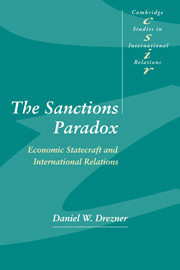1 - Introduction
Published online by Cambridge University Press: 15 January 2010
Summary
A tale of two cases
On August 6, 1990, the United Nations Security Council voted to impose multilateral economic sanctions against Iraq in response to Saddam Hussein's invasion of Kuwait. By any conventional measure, these sanctions achieved the greatest degree of international cooperation in modern history. Iraq suffered damages equal to roughly half its pre-war gross national product, a cost far outweighing any other sanctions attempt in this century. Despite the severe economic dislocations suffered by the Iraqi regime, it refused to surrender any Kuwaiti territory. Ignoring claims that the sanctions would have worked with time, the US-led coalition decided to retake Kuwait through military force. On April 3, 1991, the Security Council voted to extend the sanctions regime until Iraq complied with additional demands to reveal its weapons of mass destruction program, recognize the border with Kuwait, and pay reparations. An unstated but desired demand was the removal of Saddam Hussein from power. Iraq has labored under the UN sanctions regime for eight years. As a result, infant mortality rates have increased sevenfold, annual inflation rose to over 4,000 percent, and per capita income has fallen to less than half pre-war levels. In the face of continued economic losses and bellicose US rhetoric, the Iraqi regime has only acquiesced to UN demands when additional military threats have been made. On every issue area, when the only pressure is economic sanctions, Iraq has not budged.
- Type
- Chapter
- Information
- The Sanctions ParadoxEconomic Statecraft and International Relations, pp. 1 - 24Publisher: Cambridge University PressPrint publication year: 1999
- 4
- Cited by



